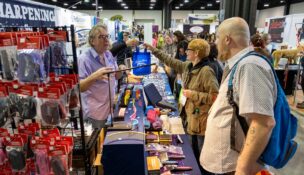Consumers Continue to Trend Toward US-made Pet Products
Glenn Polyn //December 31, 2020//
The category of pet products sourced and made in the United States is not only popular, it appears to be growing stronger. A wide variety of products, including food, treats, toys, health products, leashes, collars and harnesses, make up the American-made category. However, while U.S.-made has its benefits, it also comes with inherent challenges. True Dogs is a veteran-owned, American-made company that makes SodaPup durable dog toys for power chewers. Pet Age recently spoke with Adam Baker, founder and president of True Dogs, to get his perspective of how pet products made in the United States are performing in today’s market.
What has been your view of the consumer response to products that are made in the U.S.A.?
SodaPup is a veteran-owned business committed to manufacturing its products 100 percent in the U.S.A. In this regard, American manufacturing is a brand value, central to who we are. This separates us from other competitors who produce some but not all of their products in the United States. Our retail partners and their customers overwhelmingly love this about us.
Consumers continue to evolve. More now than ever consumers buy from brands they believe in. Brands that they trust. Brands that share their values. When consumers buy a SodaPup product, they are not just buying a dog toy. They are buying into everything that we stand for and that transforms our products into more than “just a dog toy.”
Consumers have become much more saavy over time. Historically, they shopped largely based on price. As a result, companies shifted their manufacturing overseas, chasing lower manufacturing and labor costs. But consumers have come to realize that overseas manufacturing has hidden costs such as exploitation of labor in non-democratic societies, lower safety standards, lower quality standards, and lower environmental standards. Although these costs are not built into the price of the product, they exist nonetheless. Many consumers are less willing to turn a blind eye.
In short, consumers today are more values driven. They understand that their purchasing power can influence companies to make different choices—like U.S.A. manufacturing—and those brands do are rewarded for their efforts.
Are there any unique challenges facing American-made toy manufacturers?
For sure, there are significant hurdles to U.S. manufacturing when compared to lower cost alternatives in other parts of the world. Some product types, like plush toys, are labor intensive because each item is sewn by hand. Therefore, labor costs are a primary consideration. However, those that are committed to figuring it out can make it work. For instance, American Dog is plush toy company based in Denver. The brand has focused on the high end of the plush toy market, making durable ballistic nylon toys. The higher price point of these durable plush toys allows American Dog to manufacture in the U.S.A.
For a business like SodaPup, we have to overcome both higher labor costs and higher mold costs. We build large, high capacity molds that increase our throughput. These molds are very expensive, but once we have them, we can amortize the labor cost over higher output, which makes us very competitive with China.
What are the benefits to making toys that are manufactured in U.S. facilities?
There are many advantages to producing in the United States. Probably the greatest is speed. We commercialize new products at lightning speed, often going from a napkin sketch to finished goods in our warehouse in under two months. We’re also able to maintain lower inventory levels because we can replenish more quickly and “chase” demand as needed. In this way, our cash is not tied up in inventory. We can put our free cash flow to work on new product development instead. This has allowed us to introduce new toys at a blistering pace for the past several years.
From an environmental perspective, we have a lower carbon footprint because we produce goods in our primary market. We are not shipping inventory halfway around the world in order to save a few cents but creating more pollution and carbon consumption in the process.
From a quality assurance perspective, it’s easier for us to work with factories to make sure our material standards and quality standards are being met.
Perhaps most importantly, we create jobs in the communities where we sell. Not only does this help create a sustainable economy in those communities but it also creates greater accountability for us to be good corporate citizens. Our business practices are out in the open for everyone to see, not out of sight, out of mind, on the other side of the world.
The last several years have revealed the vulnerabilities of overseas manufacturing and hence some of the benefits of domestic manufacturing. When the Trump administration began its trade war with China it leveled the playing field by eliminating China’s low cost labor advantage while also mitigating the unfair advantage created by China’s currency manipulation practices. Since overseas manufacturing is purely an economic choice, the trade war made U.S. manufacturing more attractive.
When COVID-19 hit in early 2020, shutting down much of China for over a month, it revealed a major weakness for many companies, which is the lack of a diverse supply chain. With Chinese factories shut down for 30 to 45 days, many brands were suddenly scrambling for inventory.
During this period, Sodapup has experienced no supply chain disruptions. We continue to produce with a wide variety of world class domestic partners all of whom have rigorous COVID-19 protocols in place to protect their workforce and keep their doors open.
How do American-sourced materials enable you to make a high quality product?
All SodaPup products are made from premium, FDA-compliant materials that are safe for dogs. Our materials are produced by reputable American companies, and we test our materials to ensure they achieve our high standards of safety and performance. With overseas manufacturing, it is possible to achieve high quality materials, but it’s more difficult to manage and control. When price is your primary sourcing consideration there are many ways to reduce costs. Material quality is one of the ways. For instance, we produce natural rubber toys. Natural rubber is a raw material that comes from rubber trees. Our raw material is compounded in the U.S.A. in accordance with our proprietary formulation that maximizes tear strength and longevity and is FDA-compliant. Rubber is a cross linked polymer which is a fancy way of saying that the molecular structure changes during the curing process. The molecules cross link, giving the material great tear strength. Most rubber toys produced in China are made from inexpensive rubber compounds that contain a lot of clay, which is a cheap filler material. By increasing the amount of clay and decreasing the amount of rubber you reduce the cross-linking and hence the tear strength. Which is to say that not all rubber toys are alike. Although the consumer would have trouble distinguishing the difference from looking at the product, there are vast differences in the durability of the products. You get what you pay for.
Why should the pet industry care that there are American made toys being produced?
The pet industry should care because consumer preferences are changing. Most consumers prefer American-made products over imported products. Consumers prefer American-made for a variety of reasons: quality, safety, environmentalism, social activitism, patriotism, politics, etc. Regardless of the reasons, companies that adapt to consumer preferences have a better shot at business.



















